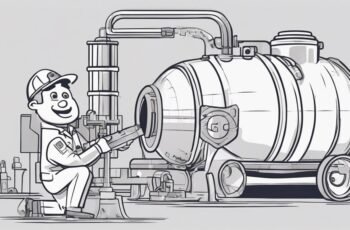If you've ever experienced the inconvenience of a septic backup, you know the importance of taking preventative measures. By implementing simple yet effective strategies, you can avoid the mess and costly repairs associated with septic system failures.
From regular maintenance to proper disposal practices, there are key steps you can take to keep your septic system running smoothly.
But there's one crucial strategy that often gets overlooked, and it could make all the difference in preventing a backup.
Key Takeaways
- Regular maintenance and inspections are essential for preventing costly septic backups.
- Proper disposal practices, like separating solids and liquids, help maintain system efficiency.
- Monitoring water usage and fixing leaks promptly reduce strain on the septic system.
- Professional services, including annual inspections and timely pumping, are crucial for system health.
Importance of Regular Maintenance

Regular maintenance of your septic system is crucial in preventing costly and damaging septic backups. Scheduled inspections are a key component of this maintenance. By having your septic system regularly inspected by a professional, you can catch any potential issues early on before they turn into major problems. These inspections allow for the identification of any leaks, blockages, or other issues that could lead to a backup if left unattended.
In addition to scheduled inspections, taking preventive measures is essential. This includes being mindful of what you flush down your drains and toilets. Avoid flushing items such as grease, oil, feminine hygiene products, wipes, or excessive amounts of paper products. These items can clog your septic system and increase the risk of a backup occurring. By being cautious about what you introduce into your septic system, you can help maintain its efficiency and prevent backups from happening.
Proper Disposal Practices
To ensure the proper functioning of your septic system and minimize the risk of backups, it's crucial to adhere to appropriate disposal practices. Implementing eco-friendly practices and embracing responsible homeownership are key aspects of maintaining a healthy septic system.
Here are some essential guidelines to follow:
- Avoid Harsh Chemicals: Opt for biodegradable and septic-safe products to prevent disrupting the natural balance within your septic tank.
- Proper Waste Segregation: Separate solid waste from liquids to reduce the load on your septic system and promote efficient decomposition.
- Limit Grease Disposal: Grease can solidify in your septic tank, leading to clogs and backups. Dispose of grease properly in the trash instead.
- Mindful Water Usage: Be conscious of the amount of water you use to prevent overloading your septic system and ensure its optimal performance.
Monitoring Water Usage
Monitoring water usage is essential for maintaining the efficiency and longevity of your septic system. By keeping track of your water consumption, you can detect any abnormal patterns that might indicate a leak in your plumbing system. Regularly checking for leaks and promptly addressing them is crucial to prevent excess water from entering your septic tank, which can overwhelm the system and lead to backups.
In addition to leak detection, practicing water conservation habits can significantly reduce the strain on your septic system. Simple actions such as fixing dripping faucets, installing water-efficient fixtures, and being mindful of water usage during daily activities like showering and laundry can make a big difference in prolonging the life of your septic system.
Professional Inspections and Pumping
Ensuring professional inspections and timely pumping of your septic system is crucial for maintaining its functionality and preventing backups. Regular inspections help identify potential issues early, while pumping removes accumulated solids that could otherwise cause blockages.
To stay on top of your septic system's health, follow these key strategies:
- Inspection Frequency: Schedule inspections at least once a year to catch any issues before they escalate.
- Pumping Schedule: Pump your septic tank every 3-5 years, depending on household size and water usage, to prevent solids from clogging the system.
- Service Provider: Choose a reputable septic service provider with experience and positive reviews to ensure thorough inspections and proper maintenance.
- System Health: Monitor the overall health of your septic system by keeping records of inspections, pumping dates, and any repairs made to address problems promptly.
Frequently Asked Questions
Can Certain Household Products or Chemicals Harm the Septic System and Increase the Risk of Backup?
Using harmful products or chemicals can damage your septic system, leading to an increased risk of backup. Follow proper maintenance practices to avoid these issues. Regular inspections, pumping, and being mindful of what goes down your drains are crucial.
Are There Any Landscaping Practices That Can Help Prevent Septic System Issues?
Want to keep your septic system running smoothly? Implement proper landscaping practices by ensuring good drainage solutions. Avoid creating low spots where water pools as it can lead to septic issues. Be mindful!
How Often Should the Septic Tank Be Inspected for Signs of Potential Backup?
You should have your septic tank inspected every 1-3 years to identify potential risks of backup early. Neglecting inspections may lead to costly repairs or health hazards. Regular maintenance helps prevent emergencies and ensures your system functions properly.
Are There Any Warning Signs of a Potential Septic Backup That Homeowners Should Be Aware Of?
Pay attention to early indicators like slow drains, gurgling sounds, or foul odors. Regularly pump your septic tank, avoid flushing non-biodegradable items, and be cautious with water usage. These maintenance tips can help prevent costly backups.
What Are Some Common Misconceptions About Septic Systems That Can Lead to Backup Issues?
Think you know it all? Common myths about septic systems can cause trouble. Proper maintenance isn't just a suggestion; it's a necessity. Don't fall for misconceptions; educate yourself to prevent backup issues.
Conclusion
In conclusion, implementing top strategies to prevent septic backup is crucial for maintaining a properly functioning septic system.
Did you know that a single leaky faucet can waste up to 3,000 gallons of water in a year?
By following the recommended maintenance, disposal, and monitoring practices, you can avoid costly septic backups and ensure the longevity of your system.
Remember, prevention is key in preserving the health and efficiency of your septic system.

